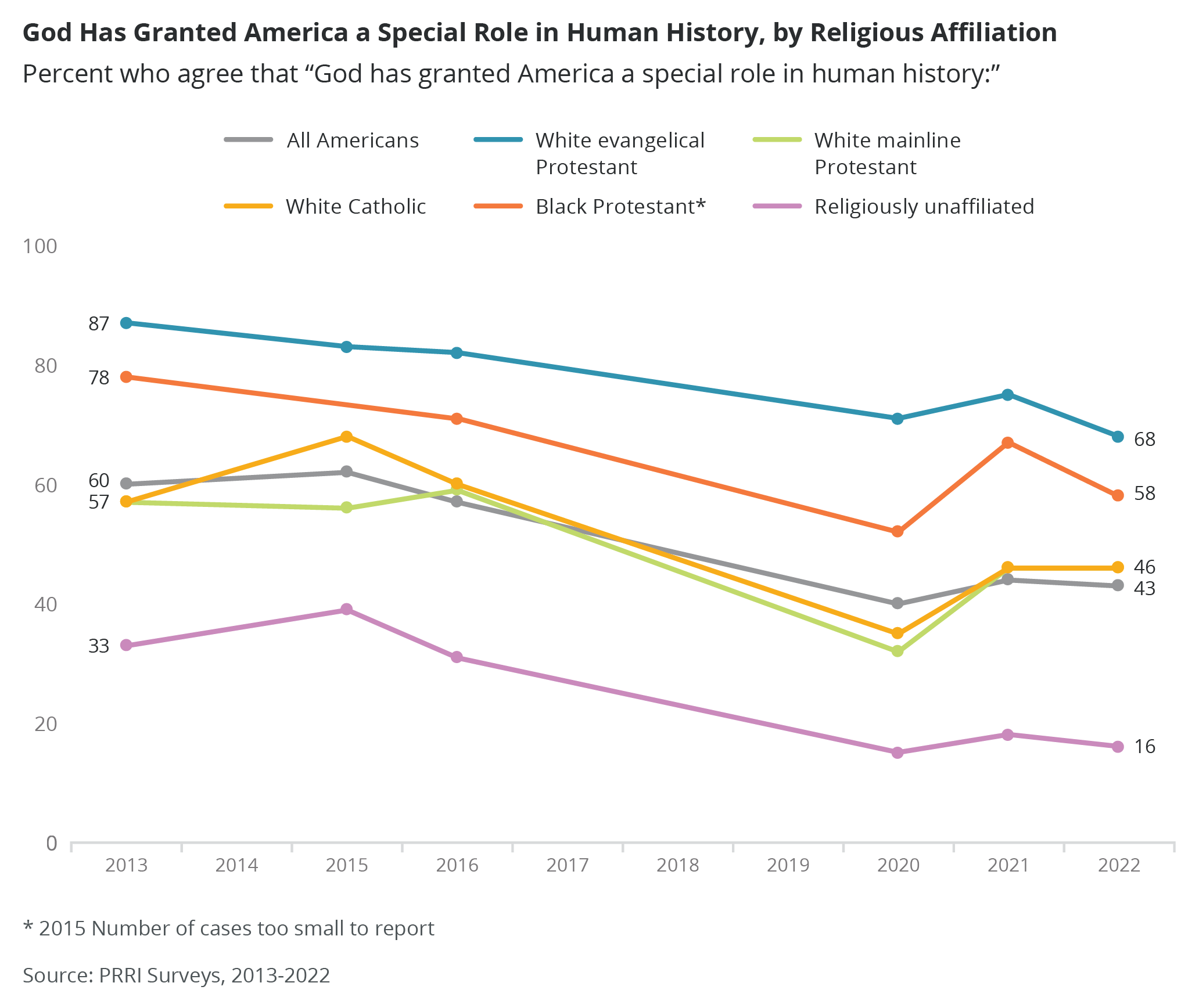“Sound of Freedom” starring Jim Caviezel, known for his role as Jesus in Mel Gibson’s “The Passion of the Christ,” made a big splash at the box office when it opened over the Fourth of July weekend. The film tells the story of Latter-day Saint Tim Ballard, a special agent and undercover operator for the U.S. Department of Homeland Security, who gives up working for the government in order to found Operation Underground Railroad, a controversial anti-sex trafficking organization.[1]
The film’s box office success is tied to its warm reception in evangelical circles. An evangelical darling since “Passion of the Christ,” Caviezel himself is certainly a draw and, as many news outlets have reported, the film’s plot dovetails with key components of the QAnon conspiracy, which white evangelical Protestants adhere to more prominently, according to PRRI polling data. Specifically, about one in four white evangelical Protestants (23%) are QAnon believers, compared to 16% of all Americans.[2]
In promotional interviews, Caviezel, a Catholic who is a proponent of QAnon claims and an outspoken conservative, framed the actions of Ballard as Christian activism on behalf of the nation. On “The Charlie Kirk Show,” Caviezel thanked Kirk for his Turning Point USA work as he talked about the film. “We’re at a point here,” he said, “where, if the Christians don’t stand up, our republic is finished.”
For Caviezel’s many white evangelical Protestant fans, interweaving conservative Christian activism with the fate of the nation is nothing new. In 2022, the percentage of white evangelical Protestants who agree that “God has granted America a special role in human history” is high — much higher than the general population of the United States (68% vs. 43%). And, over time, that percentage has been consistently higher than white mainline Protestants, white Catholics, Black Protestants, or religiously unaffiliated Americans.
 According to PRRI polling data, over the past decade, far more white evangelical Protestants agree that God has a special role for America in human history compared to all Americans (there are stark differences of about 21-31 percentage points, depending on the year). While belief in this notion has precipitously declined in the general population, solid majorities of white evangelicals continue to keep the faith in the nation’s providential significance.
According to PRRI polling data, over the past decade, far more white evangelical Protestants agree that God has a special role for America in human history compared to all Americans (there are stark differences of about 21-31 percentage points, depending on the year). While belief in this notion has precipitously declined in the general population, solid majorities of white evangelicals continue to keep the faith in the nation’s providential significance.
“Sound of Freedom,” with its American protagonist righting international wrongs, certainly upholds this notion, and decades of white evangelical and Latter-day Saint filmmaking could help explain these consistently higher rates. It is worth noting that even though Latter-day Saints and evangelical Protestants disagree about the nature of God and scripture — and many evangelicals argue that Mormons are not Christian — PRRI polling data shows longstanding agreement among white evangelical Protestants and Mormons when it comes to political values and beliefs.
White evangelical protestant media makers like the Rev. Billy Graham began experimenting with filmmaking as a vehicle for promoting evangelical Christianity in the 1950s with World Wide Pictures, a subsidiary of the Billy Graham Evangelistic Association. Graham’s films complemented his Cold War patriotism, which linked American democracy to Christianity, as well as the Southern Baptist pastor’s conviction that restoring the nuclear family — most often depicted by white actors — was the key to a thriving, godly society.
As the 20th century progressed, activist groups like James Dobson’s Focus on the Family and Bill Gothard’s Institute in Basic Life Principles also produced films aimed at training conservative families. Christian broadcasters like the Trinity Broadcasting Network also made films that celebrated the United States as a haven from the horrors of communism.
The Church of Jesus Christ of Latter-day Saints (LDS) enthusiastically promoted religious and American exceptionalism in ways that evangelicals could appreciate, especially when it came to filmmaking. Nostalgic depictions of so-called small town American values in “The ButterCream Gang,” for example, produced by the predominantly LDS-staffed Feature Films for Families, found their way into evangelical households, along with films celebrating Mormon ideals of God and country.
In some conservative households, direct-to-video evangelical and Latter-day Saint films were the only form of entertainment available. Over time, this movie genre has broken into the mainstream. Companies like PureFlix — founded by evangelicals, but acquired by Sony in 2020 — have arguably perfected the model of filmmaking for conservative audiences and taken it to the general market. And, they have brought their messaging about America’s special role in God’s plan with them. The “God’s Not Dead” film franchise, for example, features the trials and triumphs of the Rev. David “Dave” Hill, a white evangelical baby boomer who is determined to reestablish the godly origins of the United States, at odds with a supposedly degraded version of American government.
Pastor Dave’s adventures, like those of Tim Ballard, have garnered surprisingly high profits. The franchise is buoyed by support from conservative evangelical and Mormon organizations alike, who welcome depictions of evangelicals as heroic figures with special insight into God’s plans for the world, and a calling to uphold the United States and its ideals. “Sound of Freedom’s” success in particular demonstrates how white evangelical Protestant and Latter-day Saint media makers are collaborating to create media for these audiences. The movie was released by Angel Studios, a company founded by Latter-day Saint brothers, which also released the streaming megahit (and evangelical favorite) about the life of Jesus, “The Chosen.”
The success of “Sound of Freedom” all but guarantees that films featuring a heroic man with an enduring belief that God has granted America a special role in the world will continue.
[1] The film’s box office success is tied to its efficient marketing strategy, warmly received by evangelical filmgoers. In fact, the Trump 2024 presidential campaign reportedly hosted a screening of the film on July 19 to “burnish both his record on human trafficking and his credentials with evangelical Christians.”
[2] To understand both the scope and the makeup of the QAnon movement, PRRI fielded a set of three questions in four different surveys over the course of 2021, measuring agreement or disagreement (completely agree, mostly agree, mostly disagree, or completely disagree) with foundational QAnon beliefs: (1) The government, media, and financial worlds in the U.S. are controlled by a group of Satan-worshipping pedophiles who run a global child sex-trafficking operation. (2) There is a storm coming soon that will sweep away the elites in power and restore the rightful leaders. (3) Because things have gotten so far off track, true American patriots may have to resort to violence in order to save our country.
Leah Payne, Ph.D., is a member of the 2022-2023 and 2023-2024 cohorts of PRRI Public Fellows.
